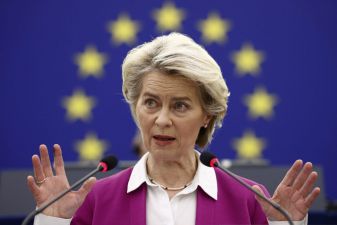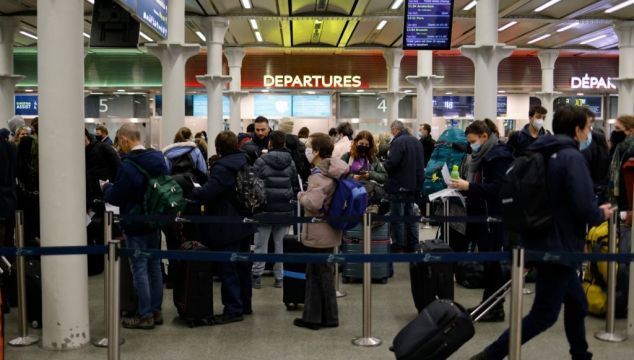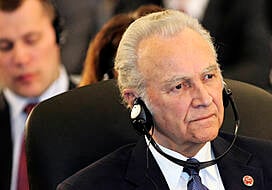European countries prepared to impose further restrictions on travel and more on Friday, in an effort to stem surging cases of the Omicron variant of Covid-19.
Denmark, Germany and Ireland were all considering further restrictions in the days before Christmas festivities kick off in earnest, following the footsteps of France, which closed its borders this week to most non-resident Britons.
Denmark's prime minister said on Friday her government would propose new restrictions to curb the rapid spread of the new variant, which now accounts for a fifth of all cases registered in Denmark.
"In record time, the rules of the game have again been changed," Mette Frederiksen said at a news conference, referring to Omicron.
The new restrictions, which will need approval from parliament, include closing of places such as theatres, cinemas, entertainment parks and conference centres. It also proposed to ban the serving of alcohol after 10pm and urged Danes to limit their social contacts.
Denmark has registered 11,559 Omicron cases so far, the health minister said. Overall daily infections broke another record on Friday as 11,194 new ones were logged. Death rates and hospital admissions, however, are still far below levels seen a year ago.
Portugal braces for Omicron
Portugal said on Friday it estimated infections with the fast-spreading Omicron variant were doubling every two days and could account for 80 per cent of all new cases by the end of December.
The current prevalence of Omicron in Portugal was around 20 per cent, health minister Marta Temido told a news conference. That rate would mean many more people had come down with Omicron than the latest official tally of 69 confirmed cases.
"It may be of 50 per cent in the Christmas week and 80 per cent in the last week of the year," the minister added.
The country, which has one of the world's highest rates of vaccination against Covid-19, reported 5,800 new infections on Wednesday in the highest daily jump since early February, when it faced its toughest battle against the virus.
Deaths and hospitalisations, however, remain far below levels seen during that period.
Ms Temido stopped short of announcing new measures, but said more needed to be done to control contagion and that the next few days will be decisive in understanding the impact of the new variant.
For now at least, she said "more mask-wearing, more testing, more vaccination, more border control" is necessary.
Portugal has already ordered all passengers flying into the country to show a negative test on arrival. Remote work will be mandatory and schools will be closed in the first week on January.
Portuguese prime minister Antonio Costa said on Thursday those restrictions could be extended as Omicron spread.
Germany and Britain
Meanwhile in Germany under rules that could be announced later on Friday, travellers to the country from Britain would be required to quarantine for two weeks, a German health ministry spokesperson said.
New cases of Covid-19 in Britain hit a record high for the second day running on Thursday, as England's chief medical officer warned daily hospital admissions could also hit new peaks due to the fast-spreading Omicron variant.
Britain reported 88,376 new infections, the highest since the start of the pandemic and up around 10,000 since the previous record set on Wednesday.
The surge in cases was piling pressure on a health service struggling with staff sickness, England's chief medical officer Chris Whitty said on Thursday.
Omicron is so transmissible that even if it proves to be milder than other variants, it could still cause a surge in hospital admissions, Dr Whitty told lawmakers.
Susan Hopkins, the chief medical adviser at the UK Health Security Agency, said there were 15 proven cases of Omicron in hospitals, but that the number was likely to be much higher.
Austria loosens lockdown
Meanwhile on Friday, in a move at odds with much of the continent, Austria said it was temporarily loosening its lockdown on those not fully vaccinated against Covid-19 over Christmas and New Year's Eve thanks to a drop in infections.
"Christmas should show us once again how important contact with our loved ones is and how precious time together is," health minister Wolfgang Mueckstein said.
Austria was the first country in Western Europe to reimpose lockdown last month - its fourth of the pandemic - as infections hit record levels. That has brought repeated street protests.
With cases plummeting since, the government had eased the full lockdown last weekend but kept curbs on the unvaccinated and plans to make inoculation compulsory as of February.

"We have in recent weeks gained an advantage that we want to use. We want to use it to take a moment to pause over Christmas to remember what is really important," Mr Mueckstein told reporters.
Despite the seasonal relaxation, the Austrian government like others around the world is bracing for an explosion of infections from the more contagious Omicron variant. It has registered 75 Omicron cases so far.
Mr Mueckstein declined to say whether Austria will impose another full lockdown in January because of Omicron, but said the country was two to three weeks behind Denmark and Britain where the situation was worrying.
"I cannot and will not rule anything out for January," he said.







